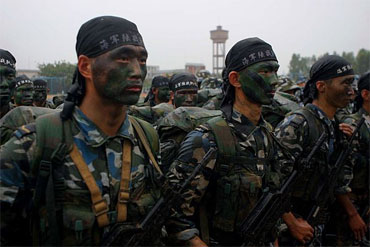Tin Thit, the coordinator of the Myanmar-China Pipeline Watch Committee in Mandalay, is cited in NPR on Friday saying that although the Myanmar army will station soldiers in Shan State to protect the pipeline, this act could fuel the insurgency and threaten national security.
 “If insurgents attack or blow up part of the pipeline, the Chinese could send troops into Myanmar to protect it,” Tin Thit is quoted as saying. “This would have a huge impact on our sovereignty.”
“If insurgents attack or blow up part of the pipeline, the Chinese could send troops into Myanmar to protect it,” Tin Thit is quoted as saying. “This would have a huge impact on our sovereignty.”
Washington-based NPR said that officials in both countries deny such a thing could ever happen. “Nonetheless, it's a common perception among Burmese,” it reported.
Wong Aung of the Shwe Gas Movement told Mizzima on Monday that local resistance to the pipeline will prevent it opening as scheduled. “I am confident that China will not be able to complete the pipelines project as planned in May because some infrastructure development still needs to be completed, especially in the conflict area in northern Shan State,” he said. “The resentment and anger of the local people over the project are growing due to involuntary relocations and uninformed consent during the project activities.”
These are testing times for the Chinese government and its associated investors. The suspension of the Myitsone Dam and the Latpadaung copper mine project must have tried their patience. Losing the Shwe pipeline might push them to the brink.
Is it unrealistic to believe that Beijing would not order its troops across the border to protect China’s national interests? Has it already made a contingency plan for such a scenario? Some analysts have suggested that the Chinese have suddenly taken a renewed interest in arming their old allies, the United Wa State Army.
Several news agencies closely aligned with the Beijing government reported only last week that the Chinese military had last year contemplated using drones to assassinate drug kingpin Naw Kham. If Laotian authorities had not apprehended the Shan warlord in April and handed him over to their Chinese counterparts, would plans for a strategic strike in northeastern Shan State have gone ahead?
Perhaps, but perhaps not. However the fact that China is making its southwestern neighbor aware of its military capabilities sends a message hard to ignore.
It is highly likely that Chinese patience and its committed policy of respecting sovereignty will be put to the test in the coming months—not only in containing the Kachin conflict, but also in protecting a vital pipeline from sabotage.
Naypyitaw must realize that time is running out to agree a concrete ceasefire with the KIA if its wants to avoid putting its Chinese counterparts in that very position.



